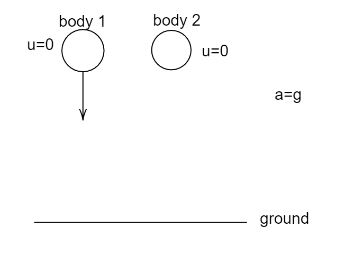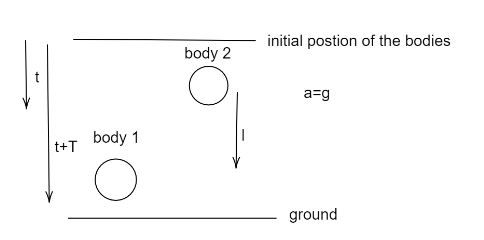Question
Question: two bodies begin to fall freely from the same height. The second one begins to fall \(\tau s\)after ...
two bodies begin to fall freely from the same height. The second one begins to fall τsafter the first. The time after which the 1st body begins to fall, the distance between bodies equals l is.
A. gτl+2τ
B. lgτ+τ
C. lgτ+τ2
D. lτg+2τ
Solution
this question is from the kinematics section, so we will be using the kinematics equation s=ut+21at2 . We have been given two bodies which are at the same height falling freely which means we will take the initial velocity as zero. We will find the distance covered by body 1 and body 2 . We will subtract the distance and will put it equal to l. Will solve the equation and find our required time.
Complete step by step answer:
Initially it has given that both bodies are at the same height and fall freely.

After τs body 1 will move, and body 2 would have been moved to t+τ, it is given in the question that after t+τ the difference between two bodies is l , then we have to find the value of t. See the following diagram,

Here t+T=t+τ. We will find the distance covered by body 1 in time t+τ and by body 2 in time t . And by subtracting both and putting it equal to l we will find our required t. Using the second equation of motion
s=ut+21at2
We know u=0 and a=g
So, s=21gt2
Let distance covered by body 1 be s1 and distance covered by body 2 be s2
Therefore, s1=21g(t+τ)2
s2=21gt2
Now we have to find the value of t
So s2−s1=l
Putting values from above
21gt2−21g(t+τ)2=l
Solving this we will get
21g[t2−(t−τ)2]=l
⇒(t+t−τ)(t−t+τ)=g2l
⇒2t−τ=gτ2l
⇒t=21[gτ2l+τ]
∴t=gτl+2τ
Therefore, option A is the correct answer.
Note: There are two important motion properties that free-falling objects possess:
-Air resistance does not exist for free-falling objects.
-On Earth, all free-falling objects accelerate downwards.
The time measured is from that instant from which the second body was released. Since both the bodies were initially at zero their initial velocity is taken as zero. Acceleration is due to gravity that is why we have taken a=g.
